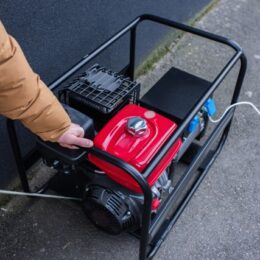
Extended power outages could impact the whole community and the economy.
A power outage may:
- Disrupt communications, water, and transportation.
- Close retail businesses, grocery stores, gas stations, ATMs, banks, and other services.
- Cause food spoilage and water contamination.
- Prevent the use of medical devices.
Remember, in extreme heat or cold, go to a community location with power if it’s safe to travel.
PREPARING FOR A POWER OUTAGE
Take an inventory of the items you need that rely on electricity. Plan for batteries and other alternative power sources to meet your needs when the power goes out, such as a portable charger or power bank. Have flashlights for every household member. Determine whether your home phone will work in a power outage and how long battery backup will last.
KNOW YOUR MEDICAL NEEDS
Talk to your medical provider about a power outage plan for medical devices powered by electricity and refrigerated medicines. Find out how long medication can be stored at higher temperatures and get specific guidance for any medications that are critical for life.
USING APPLIANCES DURING POWER OUTAGES
Install carbon monoxide detectors with battery backup in central locations on every level of your home to avoid carbon monoxide poisoning. Generators, camp stoves, or charcoal grills should always be used outdoors and at least 20 feet away from windows. Never use a gas stovetop or oven to heat your home. Turn off or disconnect appliances, equipment, or electronics. Power may return with momentary surges or spikes that can cause damage.
FOOD STORAGE
Keep some nonperishable food and water on hand. Keep freezers and refrigerators closed. The refrigerator will keep food cold for about four hours. A full freezer will keep the temperature for about 48 hours. Use coolers with ice if necessary. Monitor temperatures with a thermometer.
AFTER A POWER OUTAGE
When in doubt, throw it out! Throw away any food that has been exposed to temperatures 40 degrees or higher for two hours or more or has an unusual odor, color, or texture. If the power is out for more than a day, discard any medication that should be refrigerated unless the drug’s label says otherwise. Consult your doctor or pharmacist immediately for a new supply.
THE IMPORTANCE OF AN EMERGENCY SUPPLY KIT
You may need to survive on your own after an emergency. This means having your own food, water, and other supplies in sufficient quantity to last at least 72 hours and, if possible, for longer. Additionally, essential services such as electricity, gas, water, sewage treatment, and telephones may be cut off for days or even a week, or longer. Your supplies kit should contain items to help you manage during these outages. It is important to consider your family’s unique needs, including dietary and medical needs.
In the event of a thunderstorm, the following items in your emergency supply kit are particularly important:
- Food, water, and other items for power outages
- Battery-powered or hand-cranked flashlight in case the power is knocked out during the storm
- Portable methods for receiving alerts and warnings when you are outside to listen for emergency updates and news reports. These may include a battery-powered or hand-cranked radio or a fully-charged cell phone.
- First aid supplies for burns.
For a complete list of supplies for your emergency supply kit, visit ready.gov/build-a-kit.



